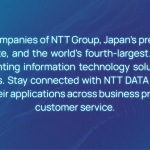Many people are no longer unfamiliar with this phrase when it comes to digital transformation. Because every day, every hour, you benefit from the digital revolution brought about through a series of convenient online transactions.
So, have you ever wondered how businesses manage millions of online transactions every day? The answer lies in Robotic Process Automation. How RPA Supports Digital Transformation? The following article of WinActor Support will give you an overview of digital conversion techniques and RPA.
What Is Digital Transformation?
Technological transformation is changing the traditional model to a digital business by applying new technologies: cloud computing, Big Data, the Internet of Things, etc…
In a broad sense, technical digital transformation is to reshape industries by restructuring the existing business and operating models. This technology has great significance in changing the operating method, leadership, working process, and company culture.
At the corporate level, digital transformation is the integration of digital solutions into the core system of an enterprise that profoundly changes the way we work. Specifically, the working process will be refreshed to match the company’s trends and practices of working. This work reinvents the traditional method, creating new ways to meet the market’s changing expectations.
In short, digital transformation is more than just a change in a business’s technological solutions or processes. It can also be a massive cultural shift, requiring a total organizational overhaul.

Benefits That Rpa Brings To Businesses
As you know, RPA is an end-to-end process automation robot. It consists of a system of bots that perform repetitive tasks of fixed logic. Each bot will have different missions and functions. The hallmark of RPA is compliance.
Yes, the software robot can work smoothly without manipulation errors during operation. It is not as innovative as AI technology, so there will never be an automatic process change with RPA.
In addition, RPA also possesses an operating speed 3 times higher than humans. A large amount of data will be efficiently processed by bots and stored on the central system in a short time. And Enterprises can access data at any time. Therefore, when it comes to Robotic Process Automation, you will have no complaints about how it works. With what RPA brings, the business performance will improve significantly day by day.
Nowadays, you can easily see the appearance of RPA anywhere. Because with the possession of many outstanding new features, Robotic Process Automation can automate processes easily in various fields, typically healthcare, insurance, banking, business,….
The main tasks of RPA are data collection, management, processing, automating search or executiving implementation of automated programs such as sending emails, making notification calls. That proves the flexibility of this technology in solving long-term process automation problems.
Besides taking advantage of RPA for repetitive tasks, businesses also need to clearly explain to employees the role of RPA before applying it.
For some employees, they will think that software robots are taking their jobs. But in fact RPA is only assisting people to solve the problem of inefficient work. We humans are more creative than machines.
As a result, businesses will need them to move to jobs that bring more value. It is for these reasons that businesses will need to do adequate thought work for their employees. From there, employees will have a more positive objective view of Robotic Process Automation.
Read more: 12 benefits of RPA in business
RPA Is An On-Demand Process Change Tool
When the market needs change, traditional processes will cause obsolescence for businesses. It will reduce labor productivity, the process will be interrupted, and the product will not compete with competitors.
In particular, enterprises monitor changes in customer behavior because, besides competitors, customers are a decisive factor in the business’s development.
One tool that can help businesses make a successful digital transformation is Robotic Process Automation. By applying this technology, business processes will be optimized, meeting all the market’s needs. Here is the perfect combination of digital conversion and RPA.
Relationship Between Digital Transformation And RPA
In essence, Robotic Process Automation is a piece of software consisting of bots that perform repetitive and similar process tasks. Currently, RPA bots can effectively perform the following functions: request processing, human resource (HR) processes, data collection, and management, invoicing, etc. So, how has RPA supported digital transformation?
RPA enables quick and easy digital transformation thanks to its inherent automation capabilities. From here, businesses will have full information about the performance of the company’s current business model thanks to the data analysis of RPA bots. As a result, they can rely on this result to propose solutions that contribute to optimizing workflow.
Another advantage of digital transformation combined with RPA is to reduce costs for businesses. For Robotic Process Automation, the amount that companies can save is about 25%-60%.
When you invest in a robot that automates the process, you will minimize errors and reduce maintenance costs. Because RPA bots can work effectively for a long time without making any manipulation errors. It will replace employees performing low-value jobs. They will have more opportunities to develop themselves in new areas that bring more value to the business.
The efficiency, compatibility, and adaptability of the software robots RPA provides business processes to transit to digital easily. At the same time, it also helps to improve, increase business value and create satisfaction for customers. And you can apply RPA to any industry because now, with its flexibility, RPA can work effectively on many different models.
So, doesn’t it distinguish what the sector of the business is? It is only necessary for the enterprise to provide the RPA with the required information about the process. The remaining task is for the RPA solution provider to select bots to create a complete automation system.
Conclusion
Hopefully, through WinActor Support’s article, you will have an overview of applying RPA in conjunction with digital transformation.
This work is efficient because, with the help of Robotic Process Automation, businesses will have the opportunity to make digital transformation simpler and faster. RPA bots will aggregate all the data of the business. The analysis and research department will rely on that to find the bottleneck to change the process effectively.

WinActor is an RPA software solution by NTT DATA Corporation to help businesses master technology, create breakthroughs in the digital age 4.0.




